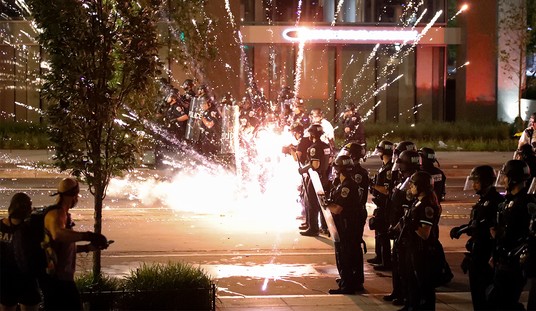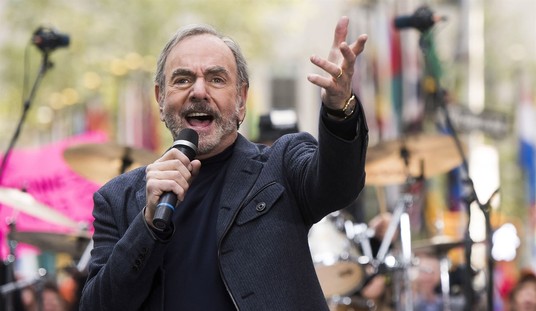In mid-December 1981, the Polish government declared martial law, hoping to suppress the Solidarity uprising that started in Gdansk earlier that year. The Soviet puppet Wojciech Jaruzelski imprisoned thousands, including Solidarity leader Lech Walesa, and attempted to suppress self-determination by the Poles through force and intimidation. Then-President Ronald Reagan immediately reacted to the imposition of martial law by publicizing his conversation with Pope John Paul II the next day (emphases mine):
The President. “Your Holiness, I want you to know how deeply we feel about the situation in your homeland.”
“I look forward to the time when we can meet in person.”
“Our sympathies are with the people, not the government.”
Three days later, Reagan made his point crystal clear in a press conference:
All the information that we have confirms that the imposition of martial law in Poland has led to the arrest and confinement, in prisons and detention camps, of thousands of Polish trade union leaders and intellectuals. Factories are being seized by security forces and workers beaten.
These acts make plain there’s been a sharp reversal of the movement toward a freer society that has been underway in Poland for the past year and a half. Coercion and violation of human rights on a massive scale have taken the place of negotiation and compromise. All of this is in gross violation of the Helsinki Pact, to which Poland is a signatory.
It would be naive to think this could happen without the full knowledge and the support of the Soviet Union. We’re not naive. We view the current situation in Poland in the gravest of terms, particularly the increasing use of force against an unarmed population and violations of the basic civil rights of the Polish people.
Violence invites violence and threatens to plunge Poland into chaos. We call upon all free people to join in urging the Government of Poland to reestablish conditions that will make constructive negotiations and compromise possible.
Certainly, it will be impossible for us to continue trying to help Poland solve its economic problems while martial law is imposed on the people of Poland, thousands are imprisoned, and the legal rights of free trade unions — previously granted by the government — are now denied. We’ve always been ready to do our share to assist Poland in overcoming its economic difficulties, but only if the Polish people are permitted to resolve their own problems free of internal coercion and outside intervention.
Our nation was born in resistance to arbitrary power and has been repeatedly enriched by immigrants from Poland and other great nations of Europe. So we feel a special kinship with the Polish people in their struggle against Soviet opposition to their reforms.
The Polish nation, speaking through Solidarity, has provided one of the brightest, bravest moments of modern history. The people of Poland are giving us an imperishable example of courage and devotion to the values of freedom in the face of relentless opposition. Left to themselves, the Polish people would enjoy a new birth of freedom. But there are those who oppose the idea of freedom, who are intolerant of national independence, and hostile to the European values of democracy and the rule of law.
Two Decembers ago, freedom was lost in Afghanistan; this Christmas, it’s at stake in Poland. But the torch of liberty is hot. It warms those who hold it high. It burns those who try to extinguish it.
Note what Reagan did not do. He didn’t say we needed to declare war on Poland, the reductio ad absurdum offered as a criticism of conservatives by progressives intent on defending Barack Obama’s weak response. Reagan kept his options close to the vest, both in this statement and during the subsequent questions asked by reporters at the presser. Reagan chose to stand for freedom and to publicly support those taking great physical risks in demanding it, keeping the pressure on the oppressors.
Compare that to the reaction that came three days later from Barack Obama during a somewhat similar (although not completely analogous) crisis in Iran:
Obviously all of us have been watching the news from Iran. And I want to start off by being very clear that it is up to Iranians to make decisions about who Iran’s leaders will be; that we respect Iranian sovereignty and want to avoid the United States being the issue inside of Iran, which sometimes the United States can be a handy political football — or discussions with the United States.
Having said all that, I am deeply troubled by the violence that I’ve been seeing on television. I think that the democratic process — free speech, the ability of people to peacefully dissent — all those are universal values and need to be respected. And whenever I see violence perpetrated on people who are peacefully dissenting, and whenever the American people see that, I think they’re, rightfully, troubled.
My understanding is, is that the Iranian government says that they are going to look into irregularities that have taken place. We weren’t on the ground, we did not have observers there, we did not have international observers on hand, so I can’t state definitively one way or another what happened with respect to the election.
But what I can say is that there appears to be a sense on the part of people who were so hopeful and so engaged and so committed to democracy who now feel betrayed. And I think it’s important that, moving forward, whatever investigations take place are done in a way that is not resulting in bloodshed and is not resulting in people being stifled in expressing their views.
Now, with respect to the United States and our interactions with Iran, I’ve always believed that as odious as I consider some of President Ahmadinejad’s statements, as deep as the differences that exist between the United States and Iran on a range of core issues, that the use of tough, hard-headed diplomacy — diplomacy with no illusions about Iran and the nature of the differences between our two countries — is critical when it comes to pursuing a core set of our national security interests, specifically, making sure that we are not seeing a nuclear arms race in the Middle East triggered by Iran obtaining a nuclear weapon; making sure that Iran is not exporting terrorist activity. Those are core interests not just to the United States but I think to a peaceful world in general.
We will continue to pursue a tough, direct dialogue between our two countries, and we’ll see where it takes us. But even as we do so, I think it would be wrong for me to be silent about what we’ve seen on the television over the last few days.
And what I would say to those people who put so much hope and energy and optimism into the political process, I would say to them that the world is watching and inspired by their participation, regardless of what the ultimate outcome of the election was. And they should know that the world is watching.
And particularly to the youth of Iran, I want them to know that we in the United States do not want to make any decisions for the Iranians, but we do believe that the Iranian people and their voices should be heard and respected.
Reagan took a stand on freedom, where Obama sounds desperate for engagement with the forces of oppression. Germany’s Angela Merkel took a much tougher stand than Obama did, calling the oppression “totally unacceptable,” while all Obama can say is that it’s “deeply troubling”.
It’s the difference between leadership and management. Reagan led, and he inspired the Poles to continue the struggle that eventually helped free half of Europe from iron-fisted domination by the Soviet Union. Obama wants to manage the crisis to keep from having to lead. Big, big difference.
Update: Don’t miss the Twitterview between Jake Tapper and John McCain on this topic. Key takeaway:
TAPPER: @SenJohnMcCain what would u say were u president? how much of a concern wd it be that “the west” supporting protestors cd be demonized? Thx
MCCAIN: @jaketapper we heard that during the Cold War when the left didn’t want us criticizing the Soviet Union b/c we could have been “demonized”
TAPPER: @SenJohnMcCain i had a feeling the memory of jailed russian dissidents hearing Reagan speak about them wd be something u were thinking about
MCCAIN: @jaketapper USA always stands for freedom and democracy!!
TAPPER: @SenJohnMcCain WH says it needs to focus on Iran’s nuke program/support for terror, must deal w Iran we have not 1 we wish we had. response?
TAPPER: @senjohnmccain to translate from twitterese: WH says “We have to deal with the Iran we HAVE, not the one we WISH we had”
MCCAIN: @jaketapper that’s revisiting the cold war arguments on how we dealt with the Soviet Union
MCCAIN: @jaketapper – we must stand strong for democracy in Iran as we stood for Democracy in Poland, Germany, and Czechoslovakia








Join the conversation as a VIP Member